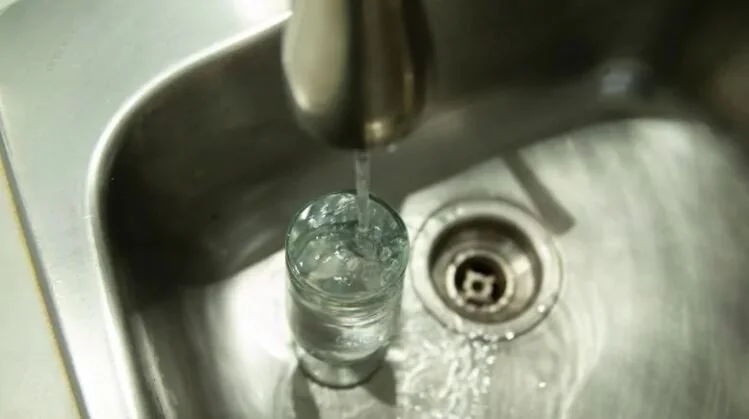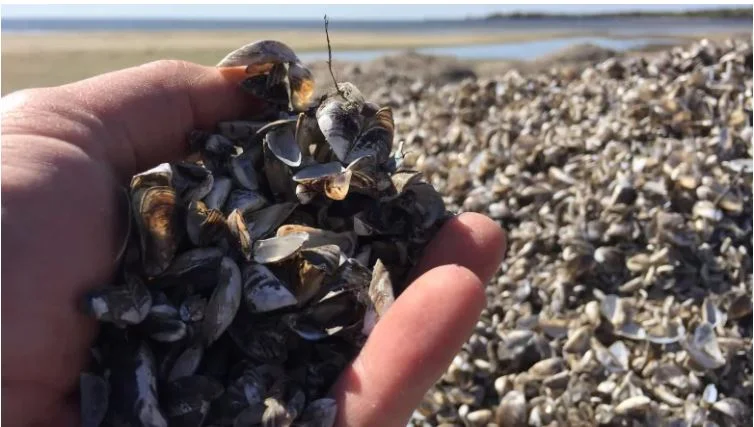A new copper plaque on the boulevard along Broadway at Donald Street aims to educate Winnipeggers about the source of their drinking water and the community surrounding it — Shoal Lake 40 First Nation. "For years Winnipeg members, their citizens, were able to … turn on their tap," said Chief Kevin Redsky of Shoal Lake 40 First Nation at the unveiling of the plaque on Friday. The plaque pays tribute to Shoal Lake as the source of city water since 1919, when the Winnipeg aqueduct was completed. It explains how the project impacted the First Nation community and its relationship with water. "The 24-year boil water advisory, the sickness created bathing our own children, not being able to drink safe water," Redsky said.
Winnipeg's drinking water source of frustration for northern Ontario Indigenous community
About 100 million litres of fresh water flows west to the city of Winnipeg every day but the struggling Indigenous people who live on the shores of Shoal Lake say no benefits have ever flowed east to them. Compensation is decades overdue, they say, and they're now hoping favourable developments in their $500-million lawsuit against the city and the province of Ontario will tilt the odds their way.
Testing suggests 1 in 5 Winnipeg homes with lead pipes have unsafe levels of lead in drinking water
One in five Winnipeg homeowners with lead pipes will get unacceptable levels of lead in their drinking water the moment they turn on the tap, according to the City of Winnipeg. Under the city's lead water quality testing program, samples were taken from 268 homes with lead pipes between Aug. 15 and Nov. 19. The testing was done to ensure water quality met new national guidelines for lead in drinking water, which cut the acceptable amount of contamination in half last March. "Overall, the results are as expected," Renee Grosselle, manager of environmental standards with the City of Winnipeg, told reporters Tuesday afternoon.
Shoal Lake JV to build new water, wastewater system
SHOAL LAKE, ONT. — A joint venture (JV) involving Shoal Lake 40 Contractors LP and Sigfusson Northern Ltd. has been named the winning bidder in a competition to earn the right to construct a new water and wastewater system for Shoal Lake First Nation in northwestern Ontario. Indigenous Services Canada is contributing $33 million for the project, which includes construction of a water treatment plant, reservoir, raw water intake structure and lift station as well as the installation of watermain connections and fire hydrants, stated a Sept. 6 release.
A century of water: As Winnipeg aqueduct turns 100, Shoal Lake finds freedom
The taps to Winnipeg's drinking water were first turned on in April 1919, but as the city celebrated its engineering feat and raised glasses of that clear liquid, another community's fortunes suddenly turned dark. Construction of a new aqueduct plunged Shoal Lake 40 into a forced isolation that it is only now emerging from, 100 years after Winnipeg's politicians locked their sights on the water that cradles the First Nation at the Manitoba–Ontario border. "The price that our community has paid for one community to benefit from that resource, it's just mind-boggling," said Shoal Lake 40 Chief Erwin Redsky.
Invasive zebra mussel larva found in lake that supplies Winnipeg drinking water
A larval-stage zebra mussel has been found in water from Ontario's Shoal Lake, which is connected to Lake of the Woods and is the source of Winnipeg's drinking water. A single intact veliger, the microscopic larva of a zebra mussel, was found in one of six water samples taken from the lake, according to a news release issued jointly on Monday by the provinces of Manitoba and Ontario.
Our national shame: The racism inherent in our First Nations water crisis
There is also concern the changes that were made that allowed some of the advisories to be lifted were just temporary fixes. There are long-term, structural problems with the water treatment systems in many Indigenous communities that have not been addressed. Many of these places lack the proper equipment needed to remedy the operational issues with which they are confronted.








